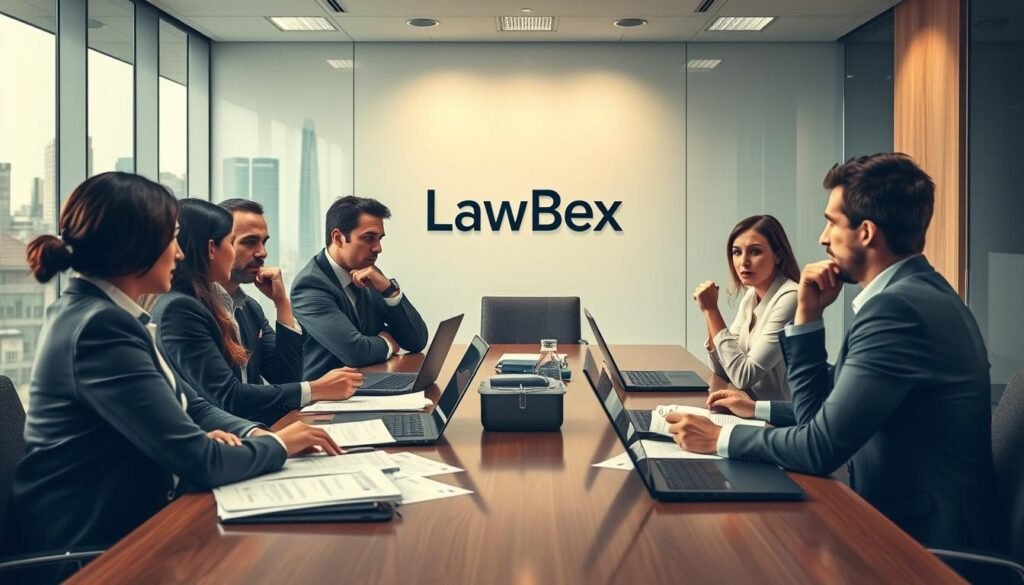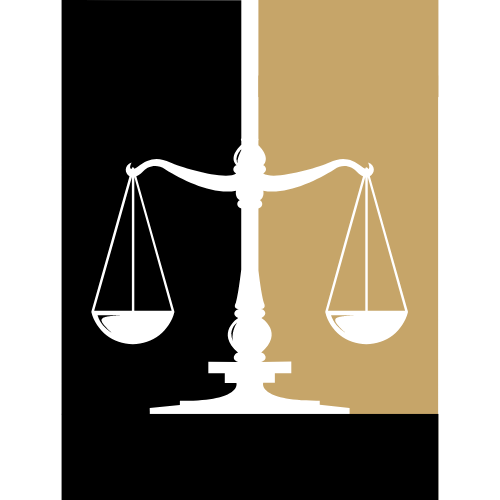Did you know over 627,000 new businesses start in the United States each year? Yet, many struggle with the complex legal world. Law for business creation and growth is essential to navigate this. This guide will cover key legal areas for business success, including legal structures, contracts, and more to help your business grow.
Key Takeaways
- Understand the different legal structures for businesses, including sole proprietorships, partnerships, and corporations.
- Learn the importance of incorporating your business and the steps involved in the process.
- Discover how to effectively manage contracts, protect your intellectual property, and ensure regulatory compliance.
- Explore strategies for managing business liabilities, financing options, and tax planning.
- Gain insights into resolving business disputes, maintaining corporate governance, and navigating employment and environmental laws.
Understanding Legal Structures for Businesses
Starting a business means making key decisions early on. One of the first is choosing a legal structure. This choice affects how you operate, pay taxes, handle risks, and grow your business. Let’s look at the pros and cons of sole proprietorships, partnerships, and corporations.
Sole Proprietorships
Sole proprietorships are simple and common for small businesses. They are owned and run by one person. This setup is easy to manage but puts the owner at risk for business debts. It’s great for freelancers and small service providers.
Partnerships
Partnerships involve two or more people sharing ownership and responsibility. They offer the chance to pool resources and make decisions together. But, they also bring the risk of conflicts and shared liability. It’s important to have a clear partnership agreement.
Corporations
Corporations are separate legal entities from their owners. They offer strong protection from personal liability. Corporations can also raise capital and have a formal management structure. But, they face more regulations and reporting, making them more complex.
Choosing the right legal structure is a big step for entrepreneurs. Think about your business goals, risk level, and growth plans. This will help you pick the best option for your business.
| Legal Structure | Liability | Taxation | Ownership | Complexity |
|---|---|---|---|---|
| Sole Proprietorship | Unlimited personal liability | Income is reported on personal tax return | Single owner | Minimal |
| Partnership | Partners are jointly and severally liable | Income is reported on personal tax returns of partners | Two or more partners | Moderate |
| Corporation | Limited liability for shareholders | Corporations pay their own income taxes | Shareholders | High |
Understanding legal structures is key to building a strong business. By evaluating your options, you can choose the best structure for your goals and protection. This is a crucial step in your entrepreneurial journey.
Incorporation: A Crucial Step
Incorporating your business is a key moment for growth and success. It’s important whether you’re starting fresh or moving an existing business. The incorporation process might seem tough, but it’s vital for business creation and setting up the right legal structure.
Choosing the right entity type for incorporation is crucial. You have options like sole proprietorships, partnerships, and corporations. Each has its own benefits and legal needs. Your choice affects your business’s operations, taxes, and how much you’re personally at risk.
- Sole Proprietorships: Simple but risky, offering no protection for your personal assets.
- Partnerships: Good for teams, sharing profits and risks, but can be complex.
- Corporations: More complex, offering protection for shareholders, and can be C-corporations or S-corporations.
Starting the incorporation process can be overwhelming. But, it’s key to safeguard your assets and follow laws. Knowing the pros and cons of each type helps you choose wisely for your business creation and legal structure needs.
“Incorporation is not just a legal formality – it’s a strategic move that can open doors and provide the foundation for your business to thrive.”
Getting help from lawyers is very helpful for a smooth incorporation. With the right advice, you can confidently move forward with business creation and set your company up for success.

Navigating Business Contracts
Contracts are key to any successful business. They outline what each party must do and what they expect from each other. This ensures a fair and beneficial relationship. We’ll look at what makes a good contract and how to negotiate and review them to protect your interests.
Key Elements of a Contract
A good business contract should have a few important parts:
- Clearly defined parties involved
- Detailed description of the goods or services to be provided
- Specific terms and conditions, including payment schedules, deadlines, and performance expectations
- Intellectual property rights and confidentiality clauses
- Termination and dispute resolution procedures
Contract Negotiation and Review
Negotiating and reviewing contracts is crucial for protecting your business. Here are some tips:
- Understand your bargaining position – Know your strengths and the other party’s needs to get the best deal.
- Communicate clearly and actively – Talk openly to clear up any doubts or concerns in the contract.
- Involve legal counsel – Have a lawyer check the contract to make sure it follows the law.
- Remain flexible but firm – Be open to negotiations, but don’t give up on important terms that could risk your business.
Learning about business contracts helps protect your company. It sets the stage for successful partnerships that last.
“A well-negotiated contract is the cornerstone of a prosperous business relationship.” – John Doe, Legal Consultant
Intellectual Property Protection
Protecting your intellectual property is key to staying ahead and stopping unauthorized use. We’ll explore patents, trademarks, and copyrights. We’ll also cover how to protect and enforce your rights.
Patents
Patents are vital for safeguarding your new ideas and inventions. They stop others from using your invention without your okay. Getting a patent is complex but crucial for protecting your work.
Trademarks
Trademarks are also crucial. They are unique signs that show who you are or what you sell. Registering your trademark keeps others from using similar names or logos, which could confuse customers.
Copyrights
Copyrights protect original works like writings, artworks, and software. Registering your copyright stops others from copying or showing your work without permission. This is especially important for businesses that create content or software.
Understanding and protecting your intellectual property can be tough. But with the right help, you can keep your innovations safe. Knowing how to protect your work gives your business an edge and helps it succeed in the long run.

| Type of Intellectual Property | Definition | Key Benefits |
|---|---|---|
| Patents | A legal right granted for an invention, providing the owner with the exclusive right to use, make, or sell the invention for a limited period of time. |
|
| Trademarks | A distinctive sign or symbol that identifies the source of a product or service, distinguishing it from competitors. |
|
| Copyrights | A legal right that protects original works of authorship, such as writings, artworks, and software. |
|
“Intellectual property is the fuel of innovation – new ideas, new technologies and new industries. And if you can’t protect that, then people won’t invest. So intellectual property protection is essential.”
– David Kappos, former Director of the United States Patent and Trademark Office
Ensuring Regulatory Compliance
As business owners, we face a complex web of rules. Keeping up with regulatory compliance is key for success. It helps avoid legal troubles and keeps your business growing.
Understanding business law and legal requirements is crucial. It’s about knowing the rules that apply to your business. This includes labor laws, environmental rules, and more.
Not following these rules can lead to big fines and legal problems. It might even stop your business from operating.
- Learn about the laws that affect your business.
- Update your policies to match new rules.
- Get help from lawyers to understand regulatory compliance.
Being proactive about regulatory compliance helps your business. It keeps you safe from legal issues and builds trust. It’s a smart move in today’s business world.
| Regulatory Compliance Aspect | Key Considerations |
|---|---|
| Labor and Employment Laws | Minimum wage, overtime, employee benefits, anti-discrimination policies |
| Environmental Regulations | Waste management, emissions control, sustainability initiatives |
| Product Safety and Liability | Consumer protection laws, product testing and certification |
| Industry-Specific Regulations | Licensing, permits, reporting requirements, sector-specific guidelines |
Regulatory compliance is more than just following rules. It’s a smart choice for your business’s future. By focusing on it, you can move your business forward with confidence.
Law for Business Creation and Growth
Starting a business is a big step, and knowing the law is key to success. The law for business creation and growth helps companies grow from the start. It protects entrepreneurs and helps businesses grow, leading to economic success.
There are important things to think about in the legal framework. The legal structure of a company, like a sole proprietorship or corporation, is crucial. When a company is formed, it must follow legal steps. Contracts are also vital, as they protect everyone involved in business dealings.
Protecting intellectual property is also key. Patents, trademarks, and copyrights help businesses stay ahead. Companies must always follow the law to avoid legal trouble.
“The law for business creation and growth is not just a set of rules, but a dynamic ecosystem that empowers entrepreneurs to turn their dreams into reality.”
Understanding the law helps businesses grow and succeed in the long run. The law guides entrepreneurs, helping them grow and boost their community’s economy.

Managing Business Liabilities
Keeping your business safe from potential risks is key to its success. We’ll look at the legal side of product and employment liabilities. We’ll also share tips on managing risks well.
Product Liability
Product liability means a business is responsible for any harm caused by its products. It’s important to focus on making products safe and of high quality. This can lower the chance of legal issues.
Testing products well, keeping good records, and following industry rules can help. These steps can make your products safer for customers.
Employment Liability
Workplace issues like discrimination, harassment, or injuries can lead to legal problems. Having strong HR policies, training employees, and following labor laws are crucial. These steps can help avoid legal troubles.
By tackling business liabilities, product liability, and employment liability head-on, businesses can stay safe. Regular checks, good insurance, and ethical practices are all important. They help protect your business from harm.
“Effective risk management is not just about minimizing liabilities, but about creating a culture of accountability and proactive problem-solving within your organization.”
Financing Options and Legal Considerations
Starting a business means finding the right money. But, getting business financing can be tricky because of the law. We’ll look at different ways to get money and the legal considerations to keep your business safe.
One way to get money is through equity investment. This means giving up some of your company for cash. It can bring in new skills and money, but you need to think about legal stuff like agreements and rights.
Another option is debt financing like loans or credit lines. This way, you keep control but need to understand legal terms like covenants and repayment plans.
If you’re looking for investment from big investors, the law gets even more complex. You’ll need lawyers to help with contracts, checks, and making sure everything is fair.
In the end, getting the right money and knowing the legal side is key to a successful business. By knowing your options and the legal rules, you can make smart choices that help your business grow.
“Effective financing and legal strategies are the foundation for long-term business success.”

Taxation and Business Law
As businesses grow, understanding taxes becomes key. Good tax planning and following tax rules can greatly improve a company’s finances. This is crucial for success.
Tax Planning Strategies
Businesses need to plan taxes well to save money. They can do this by:
- Choosing the right business structure
- Maximizing deductions for expenses and employee benefits
- Using tax credits for things like research and hiring certain groups
- Delaying taxes through plans like retirement contributions
- Timing income and expenses to lower taxes
Tax Compliance
Staying on top of taxes is vital to avoid fines. It means:
- Filing tax returns on time
- Handling payroll taxes correctly
- Following special tax rules for certain industries
- Keeping tax policies up to date
- Getting help from tax experts
| Tax Planning Strategies | Tax Compliance |
|---|---|
|
|
Knowing about taxation and using smart tax planning can help businesses. This way, they can follow business law better and do well financially.
“Taxes are the price we pay for a civilized society.” – Oliver Wendell Holmes Jr.
Resolving Business Disputes
Business conflicts can be tough to handle. It’s important to know your legal options. We’ll look at ways to solve disputes and protect your business.
Alternative Dispute Resolution
Alternative dispute resolution (ADR) is a cost-effective way to solve conflicts. It’s faster than going to court. Methods like mediation and arbitration help find solutions that work for everyone. This keeps business relationships strong while following the law.
- Mediation: A neutral third party helps parties negotiate a settlement.
- Arbitration: An impartial arbitrator makes a binding decision, quicker and more private than court.
Litigation
When ADR doesn’t work, businesses might go to court. This formal process involves filing a lawsuit. It’s more expensive and time-consuming but might be needed to protect rights.
| Alternative Dispute Resolution | Litigation |
|---|---|
| More cost-effective and efficient | Can be time-consuming and expensive |
| Collaborative approach to finding solutions | Formal legal process of filing a lawsuit |
| Maintains business relationships | May be necessary to uphold legal rights |
Handling business disputes needs a smart plan. Knowing your options helps manage conflicts and protect your business. This keeps you competitive in the market.
“Resolving business disputes through alternative dispute resolution methods can be a more cost-effective and efficient way to find mutually beneficial solutions.”

Maintaining Corporate Governance
Effective corporate governance is key for your business’s long-term success. As leaders, we must focus on strong governance. This ensures accountability, transparency, and goal alignment.
To keep corporate governance strong, we must follow legal rules and best practices. This includes:
- Creating a well-structured board of directors with clear roles and duties
- Encouraging integrity, ethical behavior, and financial openness in our organization
- Talking to key stakeholders to build trust and align governance with their interests
- Putting compliance efforts into our governance to reduce risks and follow laws and regulations
By focusing on corporate governance and hiring compliance experts, we boost our business’s long-term success. This is especially important in today’s changing business law world.
“Effective corporate governance is not just a legal requirement, but a strategic imperative for businesses seeking to thrive in the long run.”
The Importance of Compliance in Governance
It’s vital to include compliance in our governance framework. This helps us avoid risks and follow legal rules. By linking our governance and compliance, we improve our business’s performance and sustainability.
| Governance Aspect | Compliance Requirement |
|---|---|
| Board of Directors | Following legal duties and responsibilities |
| Financial Reporting | Following accounting standards and regulations |
| Risk Management | Using effective risk reduction strategies |
| Stakeholder Engagement | Following transparency and disclosure rules |
By promoting a culture of corporate governance and compliance, we lay a solid base for our business’s future success and stability.
Employment Law and Regulations
Understanding employment law and labor regulations is key for business owners. It’s vital to follow the law when hiring, managing, and firing employees. This helps avoid legal trouble.
Businesses must know the federal and state laws about work. These cover hiring, pay, safety, and benefits. Keeping up with these laws can save you from fines and lawsuits.
When hiring, you must follow laws against discrimination. Laws like the Civil Rights Act and Americans with Disabilities Act are important. They protect against bias based on race, gender, age, or disability. Fair hiring and proper records are crucial.
Effective Employee Management
Good management keeps your team happy and productive. You need to know the rules about pay, overtime, and leave. Keeping accurate records helps avoid legal problems.
Terminating employees must be done right. You must follow laws against unfair firing. Document everything and be fair to avoid legal issues.
“Navigating the complex web of employment law and labor regulations can be a daunting task for business owners, but it’s a critical aspect of maintaining a legally compliant and thriving organization.”
By staying informed and proactive, you can build a great work environment. This protects your business and leads to success.
Environmental Laws and Sustainability
Businesses today face strict environmental rules to grow sustainably. These rules, set by agencies like the Environmental Protection Agency (EPA), protect our health and nature. They help companies make choices that are good for the planet and society.
Environmental laws cover air, water, and waste. Companies must follow these to avoid harming the environment and fines. By going green, they meet legal needs and help protect our world.
| Environmental Law Area | Key Regulations | Responsible Agency |
|---|---|---|
| Air Quality | Clean Air Act | Environmental Protection Agency (EPA) |
| Water Quality | Clean Water Act | Environmental Protection Agency (EPA) |
| Waste Management | Resource Conservation and Recovery Act | Environmental Protection Agency (EPA) |
Following environmental laws makes companies good citizens and boosts their image. It opens doors to new chances, cuts costs, and fights climate change. This way, businesses help the planet and themselves.
“Sustainable development is development that meets the needs of the present without compromising the ability of future generations to meet their own needs.”
The Role of Environmental Laws in Sustainable Business Practices
Environmental laws guide companies to be green and last long. They help cut waste, save resources, and use clean energy. This keeps businesses legal and helps the planet.
- Following air quality rules, like the Clean Air Act, to cut emissions and clean the air
- Keeping to water quality laws, such as the Clean Water Act, to protect rivers and oceans
- Managing waste right, as the Resource Conservation and Recovery Act suggests, to lessen harm
By following these laws, companies lead the way. They attract people who care about the environment. This makes them stand out in the market.
International Business Law
As businesses grow globally, knowing the legal rules is key. Dealing with cross-border contracts, protecting intellectual property, and following rules can be tough. But, with the right knowledge, companies can overcome these hurdles and succeed worldwide.
Navigating Global Legal Frameworks
Companies entering new markets must learn about local laws. This includes contract law, employment rules, taxes, and how to solve disputes. Keeping up with legal considerations for global expansion helps avoid risks and follow local laws.
Protecting Intellectual Property Across Borders
Protecting intellectual property (IP) is a big worry for global businesses. Getting patents, trademarks, and copyrights in many places is hard and takes time. Companies must understand IP laws in each country to keep their valuable assets safe from misuse.
| Intellectual Property Protection | Key Considerations |
|---|---|
| Patents | Understand the patent application process and requirements in each jurisdiction, and develop a comprehensive global patent strategy. |
| Trademarks | Register trademarks in all relevant markets to prevent unauthorized use and protect brand identity. |
| Copyrights | Ensure that copyrights are properly registered and enforced in each country where your business operates. |
By tackling these international business law issues, companies can reduce risks, safeguard their assets, and set the stage for global success.
“The challenges of international business law are not to be underestimated, but with the right strategies and expertise, companies can navigate these complexities and thrive in the global marketplace.”
https://lawbex.com/comprehensive-guide-to-exporting-trade-success/
COMPREHENSIVE GUIDE TO EXPORTING: TRADE SUCCESS
Conclusion
In this guide, we’ve covered key legal steps for starting and growing a business. Understanding these laws helps entrepreneurs and business owners succeed. You can now start your business with confidence, knowing it will follow the law.
The laws for starting and growing a business have changed a lot. These changes make it easier to start a business and grow it. They help with things like paying bills on time, getting loans, and using technology better.
Starting your business means you need to know the law well. Knowing the law helps protect your ideas, manage risks, and grow your business. With the right legal plan, your business can reach its full potential in the U.S. market.
